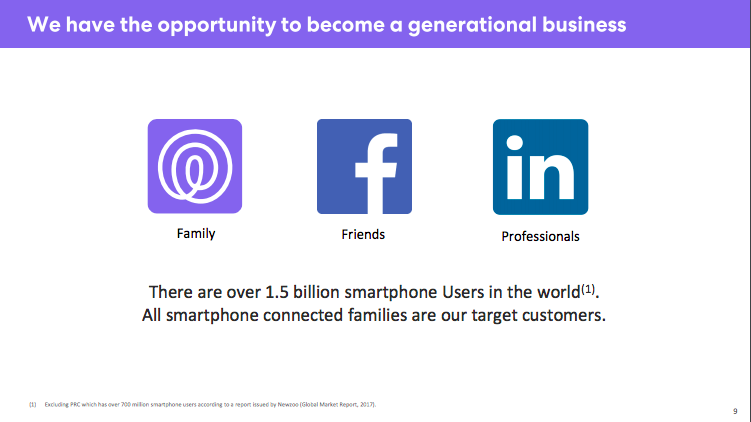Kids and online privacy: the small caps it affects and their advice for you

Pic: Morsa Images / DigitalVision via Getty Images
Social media privacy is an issue and has been probably longer than you think, particularly among children.
Ironically Facebook was a beneficiary of this in its early days. It defeated MySpace by being a safer alternative where people (usually) used their real names.
Since Cambridge Analytica the truth has come out. Being connected does not cost a cent but is not free. Firms harvest your data and make money for themselves by selling data to others and using the data to sell things to you.
So far, there has not been any statistics such as user numbers to suggest people will walk away en-masse.
How else will you remember the birthday of that high school friend you otherwise don’t think about than when Facebook reminds you?
But children, particularly those too young to have their own accounts, are another issue altogether and a more significant one than adults. This issue is in two types of technology – first, conventional social media and second, ‘tracking apps’.
Last week, American travel blogger Matthew Klint reported a very badly behaved child on a Sri Lankan Airlines flight and put photos of the child on his blog.
He ended up blurring the photos because as he admitted, the issue of child privacy became the issue among commenters rather than the child’s behaviour and the lack of discipline showed by parents. Who cares about discipline anymore?
For the babies and toddlers…
There are three child social media firms on the ASX. The first is Tinybeans (ASX: TNY) which calls itself a “modern family album app”.
It listed in 2017 and struggled with cash flow for the first two years of listed life. In 2019 however, it has surged over 300 per cent after marketing partnerships boosted its revenue.
Tinybeans has boasted it not only solves the problem of child privacy, by restricting access to one’s family and invited-only friends, but also restricts ‘sharenting’. This is a code word for spamming photos of babies.
Tinybeans boasts 3.35 million users and recently hit $1.25 million in quarterly revenue.
For the teens and pre-teens
Second, there’s Silicon Valley export Life 360 (ASX: 360). This is a child-tracking app. According to a recent investor presentation it has 20 million monthly active users.
Also, it sees itself as being the family-connector in the same way Facebook is for friends and LinkedIn is for professionals.

Yes, Life360 sees itself as a ‘Facebook for families’. It gained 11 per cent on Day 1 but has fallen 34 per cent since then.
Then there’s parental control platform Family Zone Cyber Security (ASX: FZO). It is both a an internet filtering system as well as a monitoring and reporting system for parents.
With the internet being its business model, you’re not on FZO’s side if you’re against phones in schools. On the day the Victorian government proposed a ban on phones in schools it released a curious list of reasons why they should be – essentially boiling down to thinking it won’t be enforceable.
But think of the children
Forgetting the big companies for a moment, and accepting tech companies are platforms that you’re free to leave at anytime.
But do tech platforms like those we listed above sour relationships between children and parents by eliminating trust? Should parents be uploading material their kids would not want if they were able to say so? And tracking their every move, even as they get older?
Life360’s functions are direct messaging and monitoring children’s locations. The most radical tracking apps monitor social media activity, text messages and call logs.
If children feel they are always being watched, will they lose self-confidence, have anxiety and lack capacity to be independent? If we tracked another adult’s location, would that count as harassment?
- Subscribe to our daily newsletter
- Join our small cap Facebook group
- Follow us on Facebook or Twitter
What should parents do?
Stockhead spoke with one of these companies’ CEOs, Tinybeans’ Eddie Geller, about his company and the issue of child privacy.
“We believe that lives should be private and if parents want to share their kid’s lives, it should be done in a private setting with their own family,” he said.
“The reason they share it is for other people to see what they’re up to and the challenge is then what happens. Once you post it, it ends up on hundreds of websites – it’s kind of scary.
“But the ethical dilemma is it’s actually not your lives, it’s your kid’s lives. Will your child start to be impacted? Most people are naive [about that].”
Having said this Geller said Tinybeans was that secure, they “don’t even know who our users are unless they reach out to us”. He named ex-Yahoo CEO Marissa Meyer, and Australian treasurer Josh Frydenberg as fans. But he only knew because they publicly came out as users.
“If you’re not invited [to your child’s page] you don’t see anything.”
Tracking, meanwhile…
Stockhead asked Geller about tracking platforms such as Life360 and he admitted to being a long time fan.
“I’ve been an early user and we use it across the family,” he said. “It’s a great app, a great tool, it’s very useful and our friends use it too.
“I appreciate it is selling data but it’s not identifiable, hash[ed] and [sold]. It becomes scary if [platforms] share it with the wrong people.”
While he admitted some companies can use data for the wrong things, he said it is acceptable if used in the “true spirit of commerce”.
“Consumers are bright, if they said we’re going to sell your data and they sign up, that’s fair,” he said.
“Companies have to be commercialised in a way – people don’t pay for it [apps] so you have to fund the service. It’s a balancing act of transparency and being authentic to the customer.”
UNLOCK INSIGHTS
Discover the untold stories of emerging ASX stocks.
Daily news and expert analysis, it's free to subscribe.
By proceeding, you confirm you understand that we handle personal information in accordance with our Privacy Policy.








